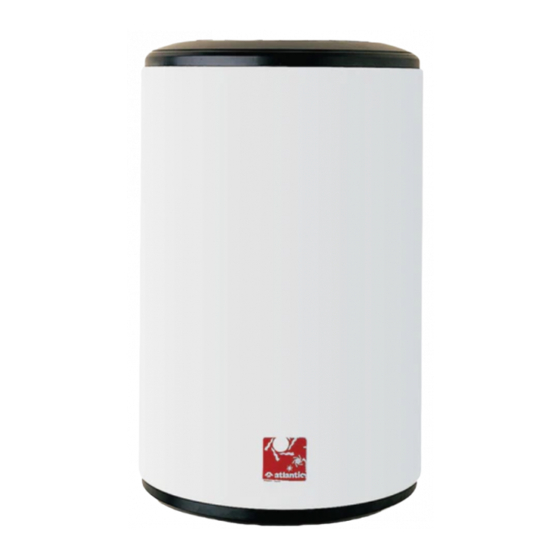Atlantic VISIO PC 10 S Snelstarthandleiding - Pagina 3
Blader online of download pdf Snelstarthandleiding voor {categorie_naam} Atlantic VISIO PC 10 S. Atlantic VISIO PC 10 S 5 pagina's. 10l, 15l, 30l, 50l water heaters

USER ADVICE AND RECOMMENDATIONS FOR MAINTENANCE
A water heater requires little maintenance.
Domestic maintenance : for the user, this means operating the pressure relief valve once or twice every month.
Maintenance by a specialist : have the equipment inspected every two years.
GUARANTEE CONDITIONS
The water heater must be installed by a qualified person in accordance with standard practice, standards in force and the requirements of these technical instructions.
It shall be used normally and shall be maintained regularly.
Under these conditions, our guarantee covers free exchange or supply to our distributor of parts that we recognise as being defective, or possibly the entire unit, excluding
labour and transport costs, and any indemnity and extension of guarantee. Our guarantee starts on the installation date (the purchase or installation invoice having probatory
force) ; if no invoice is available, the start date will be the date of manufacture shown on the water heater name plate + 6 months.
A unit supposed to have caused damage is not to be moved and must remain at the disposal of experts. The victim of the damage must warn his insurance company.
GUARANTEE LIMITS
This guarantee excludes failures due to :
Abnormal environmental conditions :
Various damages caused by shocks or dropping during handling after departure from the factory.
Positioning the heater in a location subjected to frost or humid, aggressive or badly ventilated environments. Use of water with agressiveness criteria such as those defined
by national technical rules for plumbing and hot water (content of chlorides, sulphates, calcium, resistivity and TAC). Water pressure greater than 5 bars. Electrical power sup-
ply with high overvoltages (mains, lightning...).
Damage resulting from undetectable problems due to the choice of the location (difficult access) and which would have been avoided if the heater was immediatly repaired.
An installation not in conformity with the regulations, standards and standard practice, and particularity :
New pressure relief valve missing or not installed according to national standards, or modification to its setting... No couplings (cast iron, steel or insulating) on the hot water
connection pipes which may cause corrosion. Defective electrical connection : not in conformity with national standards, incorrect earthing. The heater was switched on without
filling first (dry heating). The heater is put in a position that is not in conformity with the user's instructions.
Defective maintenance :
Abnormal scaling of heating elements or safety devices. Failure to properly maintain the pressure relief valve resulting in overpressure. Modification to original equipment
without the manufacturer's opinion, or use of spare parts not referenced by manufacturer.
The failure of a component may never be a reason for replacing the whole unit.
The complete set of spare parts is held at your disposal by the manufacturer.
NOTICE D'INSTALLATION ET D'UTILISATION
Le positionner le plus près possible du lieu d'utilisation.
Placer l'appareil à l'abri du gel (ainsi que les tuyauteries).
Fixer l'étrier sur le mur à l'aide de deux goujons M8 préalablement scellés ou chevillés.
Le montage doit être conforme aux prescriptions du DTU 60-1.
Prévoir un bac de rétention avec écoulement à l'égout si le chauffe-eau est installé au-dessus de locaux habités (combles par exemple).
MONTAGE EN PRESSION
Le chauffe-eau installé sous pression doit obligatoirement être équipé d'un groupe de sécurité neuf, ce groupe (non fourni par le
constructeur) sera obligatoirement conforme à la norme NFD 36-401 et situé le plus près possible du chauffe-eau.
Si la pression nominale du réseau est supérieure à 5 bar, prévoir le montage d'un réducteur de pression sur l'alimentation générale.
Le montage du groupe de sécurité est réalisé sur le tube d'entrée d'eau froide, au plus près du chauffe-eau, l'étanchéité étant à réali-
ser sur les filets. Il se trouve en position verticale sur tous les modèles.
La vidange du groupe de sécurité doit être raccordée à un circuit d'évacuation par l'intermédiaire d'un siphon avec garde d'air. Pendant
les périodes de chauffe l'eau contenue dans la cuve va se dilater et la soupape de sécurité en laissera échapper une partie afin que la
pression interne ne dépasse pas 7 bar.
Cet écoulement est normal et peut représenter 3% de la capacité de l'appareil à chaque chauffe.
MONTAGE EN ECOULEMENT LIBRE
Ce montage n'autorise que l'alimentation d'un seul point d'eau chaude et nécessite l'installation d'un robinet mélangeur spécifique.
Dans ce cas, il n'y a pas lieu d'utiliser un groupe de sécurité.
Attention, un léger écoulement par la robinetterie est normal pendant la chauffe de l'appareil ; la sortie de l'eau chaude ne doit
jamais être obstruée.
DANS LE CAS DE CANALISATION EN CUIVRE, UN MANCHON DIELECTRIQUE DOIT ETRE PLACE SUR LE TUBE DE SORTIE
D'EAU CHAUDE.
Maintenance
Guarantee
Mise en place du chauffe-eau
Raccordement hydraulique
GB
F
